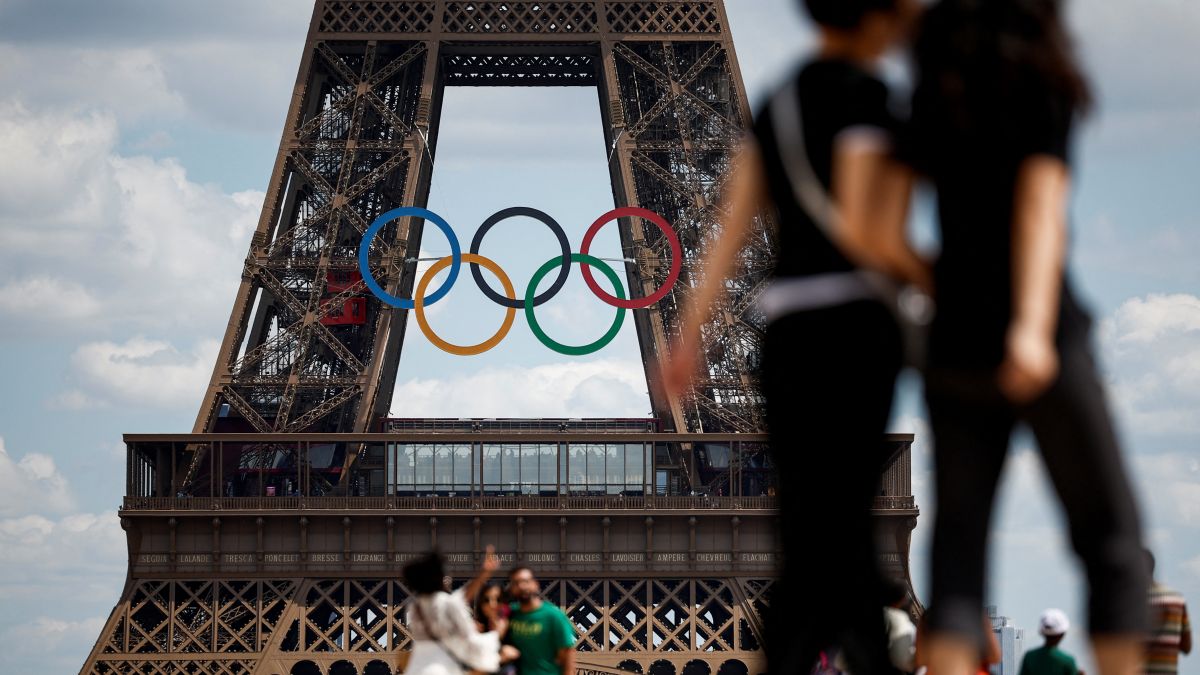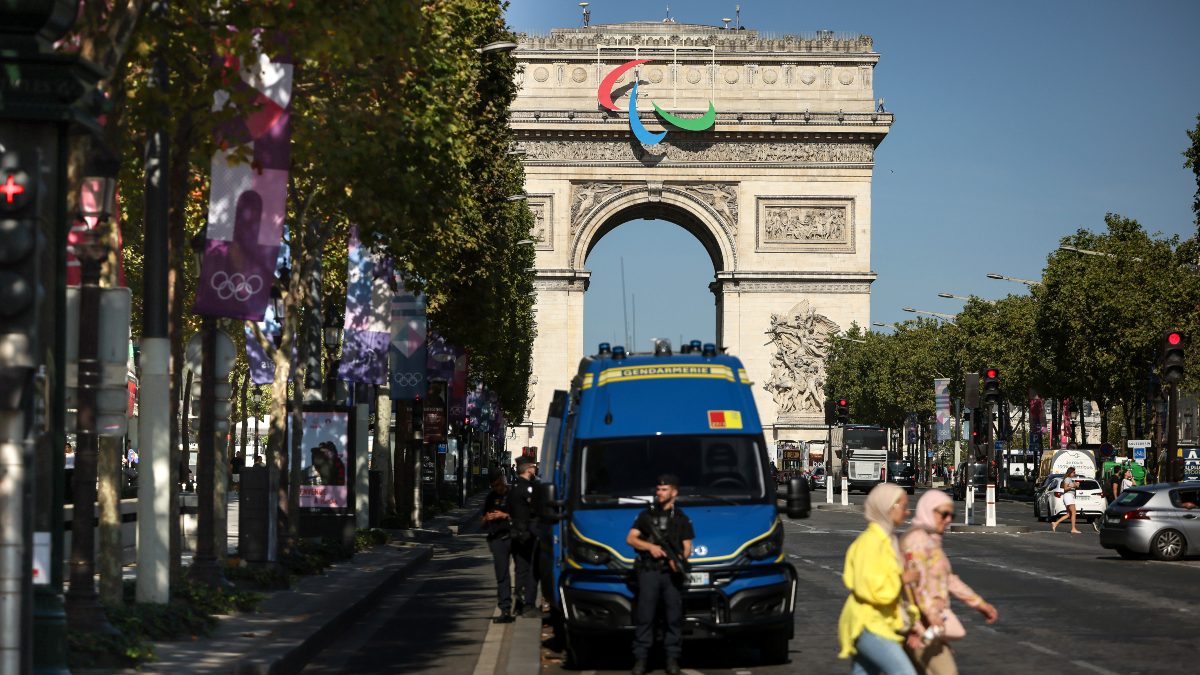To make the Paris Olympics 2024 more eco-friendly, organisers have steered clear of air conditioning in the apartments at the Village. Now some countries, including the US and Australia, have decided to carry their own AC units to the tournament amid concern that a heatwave will strike the City of Love in July read more
)
People walk at the Trocadero square as the Olympic rings are displayed on the Eiffel Tower, ahead of the Paris 2024 Olympic and Paralympic Games in Paris, France. Fears of a lingering heatwave have prompted teams to bring their own air conditioning to the City of Love for the Games. Reuters
The Paris 2024 Olympics are around the corner — the Games will begin next month on 26 July — and thousands of athletes from around the world will converge at the Olympic Village. This year, the organisers are touting it to be the most sustainable version of the event, with none of the dormitories having air conditioning.
However, in a farcical turn, when the Games start next month, the Olympic Village will become more of an energy hog than organisers had hoped as several teams, including Team USA, will be wheeling in portable air-conditioning units, foregoing the organisers’ plans of conducting the ‘greenest’ ever Games.
Why doesn’t the Olympic Village have air conditioning? How will the athletes remain cool? And which countries are bringing their ‘own chill’ with them? We answer this and much more.
Why no ACs at the Olympic Village?
In their effort to host what they are calling the “greenest ever Games” — organisers have vowed to cut the carbon footprint of London 2012 and Rio 2016 from their average of 3.5 million tonnes of CO2 to about 1.75m tonnes — the people in charge have decided not to install air conditioning at the complex where thousands of athletes and officials will stay throughout the season.
Instead, the Olympic Village has been built with a more environmentally friendly geothermal cooling system. The organising committee has said the system will keep athletes’ rooms at least 10 degrees cooler than outside temperatures.
As Nicolas Ziesel, a founding partner of KOZ, one of the architecture firms that worked on the village, told Fast Company, “AC units emit hot air that can contribute to rising the ‘ urban heat island ’ effect.”
But how will the buildings remain cool for its residents? Organisers say that a lot of thought went into designing the buildings, which will later become a sustainable new neighbourhood.
To help the apartments stay cool, the first step was the location. The development, next to the Seine River, is laid out so that when wind flows over the river, the cooler air flows between the buildings. Most rooms have cross ventilation. The buildings also have thick insulation to help keep heat out. Green roofs help insulate the buildings while doubling as a habitat for migrating birds. Shutters on the windows keep the sun out during the day and can open up at night. Continuous balconies shade the apartments below them. A new mini forest of 200 trees will also help cool the area.
Moreover, a geothermal system inside the houses will pump cool water through pipes built into concrete floors. Laurent Michaud, the Paris 2024 Olympic and Paralympic Village director, said that the cool water will be able to cool the buildings by six-10 degrees Celsius compared to the outside temperatures. And importantly, this system will work in reverse in the winter to heat the rooms.
When asked about the lack of air conditioning in the Olympic Village by news agency Reuters back in March, Paris Mayor Anne Hidalgo had said that it was “designed to avoid the need for air conditioning, even in very, very high temperatures.”
“We are on the brink of a precipice. Everyone, including the athletes, must be aware of this,” Hidalgo said. “We have to trust the scientists when they help us to construct buildings in a sober way that allows us to make do without air conditioning.”
Too hot to handle?
The lack of air conditioning at the Village, however, has become a hot topic, with many wondering if it could hurt the athletes participating.
This is because the Games running from July 26 to August 10 will be one of the hottest times in Paris. The city’s hottest day ever recorded from five years ago exceeded temperatures of 42 degrees Celsius.
Furthermore, France has been experiencing record-breaking heatwaves in recent years and Paris temperatures have climbed above 35 degrees Celsius at the end of July and August, when the Olympics and Paralympics are scheduled to take place. Some studies show that annual temperatures in Paris have warmed by more than three degrees over the past century and the ‘City of Love’ experiencing an average of nine more “scorching” days (defined as higher than 30 degrees Celsius) per year.
The 2021 Games in Tokyo have gone down in history as the hottest, with numerous athletes fainting or being carted away in wheelchairs. And researchers warn that this year’s temperatures could be even higher.
Also read: Why have Paris balconies become a big concern ahead of the Olympics?
So, who’s bringing their ACs?
With fears of rising heat and its possible impact on athletes, some countries have decided to bring their own chill to the Games. The United States is one of them.
Sarah Hirshland, CEO of the US Olympic and Paralympic Committee (USOPC), earlier confirmed that members of Team USA will have air conditioning in their rooms. “In our conversations with athletes, this was a very high priority and something that the athletes felt was a critical component in their performance capability and the predictability and consistency of what they’re accustomed to,” she said, adding that the committee has “great respect” for organisers’ focus on sustainability.
Other countries that have also confirmed that they would be bringing air conditioning with them is Canada, Great Britain, Italy, Germany, Greece, Denmark and Australia, as per a report by The Washington Post.
President of Greece’s Olympic committee, Spyros Capralos, said they would “spare no expense” for their athletes, and either buy air conditioners or find a sponsor to cover them, EuroNews reported earlier this year.
It was also reported last November that Australia would spend more than $100,000 on keeping its athletes cool with air conditioning and fans. “It’s a high-performance environment,” Strath Gordon, the chief of public affairs for the Olympic committee of Australia, one of the countries opting for the ACs, told The Washington Post.
Even Canada has announced that it would take steps to ensure the health of its athletes. The Canadian Olympic Committee, in a statement, said: “Aligned with our commitment to providing optimal health and performance conditions for Team Canada, the Canadian Olympic Committee, with its sport partners and NSOs [national sport organisations], has implemented a number of heat mitigation strategies in Paris to compliment the measures put in place by the Paris 2024 organising committee including air conditioning units in some athlete rooms in case of extreme heat.”
The Japanese Olympic Committee, last December, also announced plans to pay for its athletes to have air conditioning in their rooms for “safety and security” reasons.
However, not all countries have jumped on the air conditioning bandwagon — some simply because they can’t afford it. “We don’t have deep pockets,” Donald Rukare, president of the Uganda Olympic Committee, told The Post.
And what does Paris have to say about the plans to bring the chill? Georgina Grenon, the environmental excellence director for Paris 2024, was quoted as telling The Post, “It’s a pity.”
With inputs from agencies

 2 months ago
35
2 months ago
35
)
)
)
)
)
)
)
)
)
)
)
)
)
)
)
)
)
)
)
)
)
)
)
)
)
 English (US) ·
English (US) ·